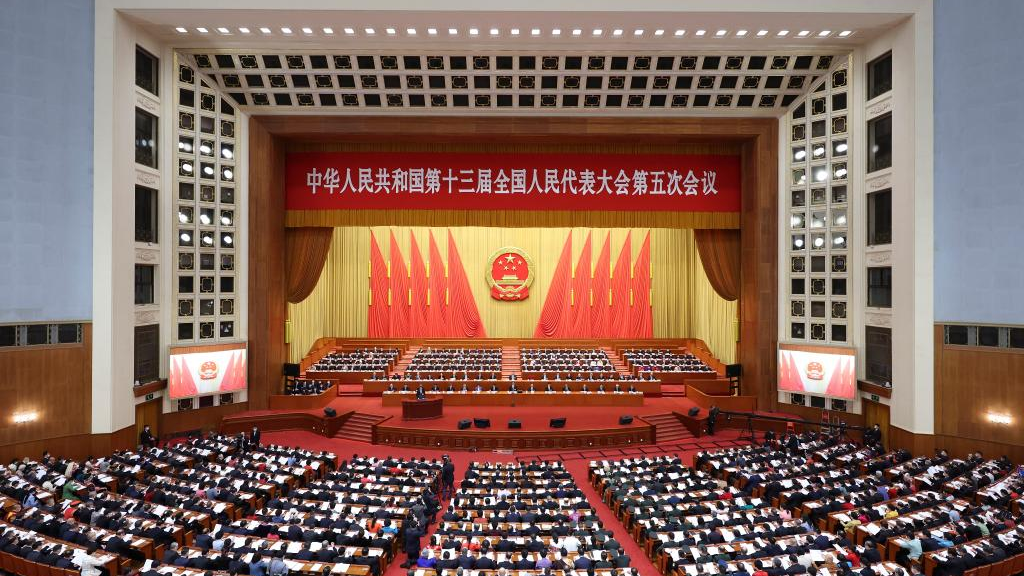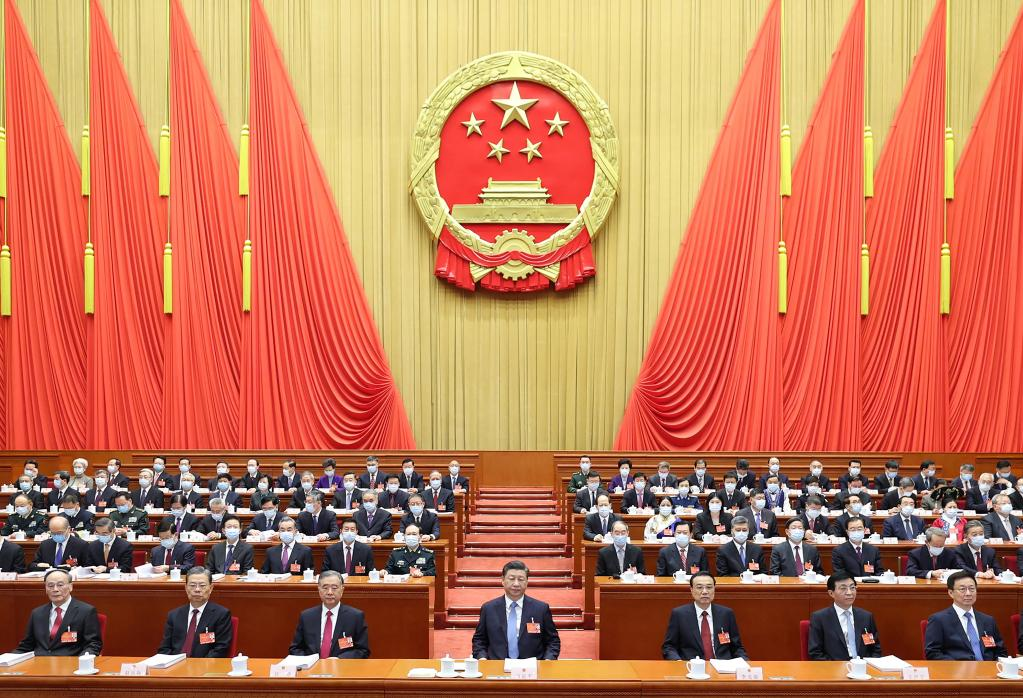
The fifth session of the 13th National People's Congress opens at the Great Hall of the People in Beijing, China, March 5, 2022. /Xinhua
The fifth session of the 13th National People's Congress opens at the Great Hall of the People in Beijing, China, March 5, 2022. /Xinhua
Editor's note: Hamzah Rifaat Hussain, a former visiting fellow at the Stimson Center in Washington and former assistant researcher at the Islamabad Policy Research Institute, is a TV anchor at Indus News in Pakistan. The article reflects the author's opinions and not necessarily those of CGTN.
As the international community grapples with global supply chain instabilities and a perpetual state of economic uncertainty due to the war in Ukraine and the pandemic, it is imperative for the global economy to tap into avenues for long-term stability and resilience. At the fifth session of the 13th National People's Congress (NPC), a strong Chinese economy with GDP growth targets set for 2022 provides optimism for global economic recovery with implications for supply chains, investments and regional connectivity which is vital in a volatile environment.
As per the Government Work Report, the word "stability" was mentioned 76 times and demonstrates the importance attached to inclusive economic prosperity amid global shockwaves for the population. The GDP growth rate set at 5.5 percent for the year 2022 also plays a key role in reviving global markets which are otherwise confronting soaring inflation, spikes in prices of gold and stock market uncertainties.
The Zhixin Investment Research Institute's assessments place the GDP growth targets set at the 13th NPC as being inclusive of macroeconomic operations and strategic development goals allowing for the economy to reach pre-pandemic levels of steady growth. The question is how the international community can benefit from such progress.
The answer lies in the size and significance of the Chinese economy which is well integrated into the global financial system. Countries partaking in the Belt and Road Initiative, for example, and faced with the effects of geopolitics and war can benefit from increased investments in infrastructural projects with multiple sources of financing available.
Note how mega projects such as the Bangladesh-China-India-Myanmar (BCIM) economic corridor or the China-Pakistan Economic Corridor (CPEC) would benefit from a strong, resilient Chinese economy with unfettered access to investments which both characterize the year 2022 and beyond. Statistics clearly indicate that China's contribution to the world economy in the post-pandemic era will increase significantly as underlined by the head of Zhixin Investment Research Institute, Lian Ping, who said that there is a good chance that the national economy's share will increase based on internal strength. This provides plenty of opportunities.

The fifth session of the 13th National People's Congress opens at the Great Hall of the People in Beijing, China, March 5, 2022. /Xinhua
The fifth session of the 13th National People's Congress opens at the Great Hall of the People in Beijing, China, March 5, 2022. /Xinhua
Note further that the drive of digitalization of the national economy as a tool to stimulate greater connectivity has global implications as well. Corporations such as Huawei have already applied advanced technologies to develop agriculture and industrial growth which has implications for global trade with greater export productivity allowing markets to flourish in times of uncertainty. International financial institutions such as the World Bank and the International Monetary Fund have already provided bleak scenarios of global economic growth confined to 4.1 percent and 4.4 percent respectively which is lower than targeted growth rates.
For those questioning the importance of GDP growth targets as enablers of a healthy global economy, it is worthwhile to look at the figures of early 2022. National exports rose by double digits in January and February 2022 with a 16.3-percent increase from 2021 while imports advanced to 15.5 percent, respectively. In contrast, the United States economy rose by 13.8 percent during the same period despite a deleterious trade war with China still in place.
With export-driven growth already in place, foreign direct investment in China is projected to increase as acknowledged by British academic John Ross. There are multilateral and bilateral benefits from such growth as well, with David Monyae, director for the Center for Africa-China Studies at the University of Johannesburg, acknowledging that China's economic growth offers the continent a new growth platform with joint development paths anchored in moral values and practicality.
The win-win potential for the global economy is immense with projected impacts likely to be felt both bilaterally and multilaterally. The chairman of the China-Italy Chamber of Commerce, Paolo Bazzoni, acknowledged that Chinese companies are "in full harmony" with values placed on Italian ones and this opens up sectors such as mechanical engineering, retail, pharmaceuticals and energy transition. These areas are interlinked with a smooth international supply chain which can only be addressed if sovereign economies grow significantly with trade and cooperation.
With the annual government work report delivered by Chinese Premier Li Keqiang indicating that foreign investors are optimistic of China's sound business environment, economic cooperation and trade can continue in turbulent times. That is precisely what is needed.
(If you want to contribute and have specific expertise, please contact us at opinions@cgtn.com. Follow @thouse_opinions on Twitter to discover the latest commentaries in the CGTN Opinion Section.)

